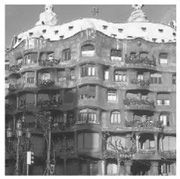On a sunny autumn afternoon, a man walks into a bar packed with laughing patrons. “I’d like a drink, please,” he says to the dark-haired bartender. But the barkeep just frowns and walks away, muttering something incomprehensible. The drinkless fellow realizes that the other customers are talking more agitatedly and staring at him.
He feels something small bounce off his sleeve; it’s a black olive. Suddenly, the crowd begins pelting him with bite-sized snacks. Under a rain of octopus morsels and deep-fried potatoes, the poor sap backs out the door and breaks into a run. The jeers follow him all the way down the cobblestone street, but he can only decipher one cruel word: “Tourista!”
You know you’re in trouble when you start having anxiety dreams about your vacation. But I can’t help it. Ever since I bought a plane ticket for my getaway to Barcelona next month, the unsettling stories have been trickling in from friends. Tales of Spanish students spraying anti-tourist slogans across the exteriors of hotels. Of restaurant service that’s going smoothly until the server realizes he or she is waiting on Americans.
To make matters worse, I’ve chosen to visit Barcelona, the seat of Catalunyan culture, a city renown for its fierce regional pride. I was hoping that my rudimentary command of Spanish would earn me a few points for not behaving like a typical American abroad, i.e. expecting the natives to understand me if I just talk very slowly and very loudly.
But in Barcelona the primary language is Catalan, as opposed to Castilian, which is what the rest of the nation speaks and Americans learn in school—that is, if we even bother to study a foreign language. Not only will I be reduced to ordering drinks by pointing, I won’t even know the common words for the tapas raining down on me when my nightmare comes true.
Yet when my mind lingers too long on paranoid visions of being buried in a hostile hail of aceitunas (olives), pulpo (octopus), and patatas bravas (fried potatoes), my next thought is, “Who could blame them?” Americans compose something like—don’t quote me on this one—six percent of the world’s population, yet use 60 percent of its resources. We waste more packaging than any other nation on earth. Sure, we’re a world leader—in producing garbage! And I mean that literally and figuratively.
“OK, Mr. Bitterness,” I hear you thinking, “If the U.S. of A. sucks so bad, what can you name about Catalunyan culture that’s so fantastic?” How about Salvador Dali, Antonio Gaudi, and Joan Mir�or starters? And the greatest Catalunyan musician alive today doesn’t even register on the radar of 99.9 percent of the refined listeners unfortunate to hold American passports. But that’s half the reason I’m facing up to my fears and going to Barcelona—so I can buy more albums by Pascal Comelade.
In a 1997 interview, Comelade listed his influences as including Eddie Cochran, the Kinks, Soft Machine, Captain Beefheart, Can, Faust, and American minimalist composers such as Steve Reich and Philip Glass. Then factor in Barcelona’s diverse musical riches, informed by France, Spain, Italy, and potent traditions from Corsica, Valencia, Mallorca, Sardinia, and the Basque country. On top of that, I’d throw in Kurt Weill (Comelade recently covered Weill’s “September Song” with ex-Soft Machine vocalist Robert Wyatt for a seven-song mini-LP) and Erik Satie as reference points. And wait till you hear what he does to “Knockin’ on Heaven’s Door” with just bongos, electronic organ, and a toy guitar.
Even though he’s been making innovative, vibrantly original music since the mid-1970s, Comelade has only just started to make a tiny dent in the English-speaking world. Part of the credit must go to PJ Harvey, who collaborated with him a few times, most notably on “Love Too Soon,” featured on the soundtrack to the 1999 Hal Hartley flick The Book of Life.
But the thing about Pascal Comelade that’s making me most excited right now is also my one glimmer of hope that the beautiful people of Barcelona don’t dismiss all Americans out of hand. Over the course of his career, the Catalunyan maestro has applied his unparalleled arranging style, distinguished by his way with both brass and toy instruments, to English-language favorites like “The Sheik of Araby” and, um, “Smoke on the Water,” and songs by red-white-and-blue artists including Suicide and Bob Dylan. If a genius like Pascal Comelade can find some merit in Deep Purple, then there’s a ghost of a chance I can walk into a tapas bar in Barcelona and not be ridiculed the minute I open my mouth.
But just in case, if anybody asks me, I’m Canadian. Sure, I’ll have to accept cultural responsibility for Celine Dion, but it’s a price I’m willing to pay. At least she’s bilingual.






